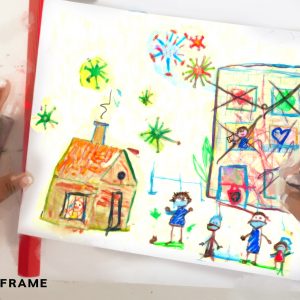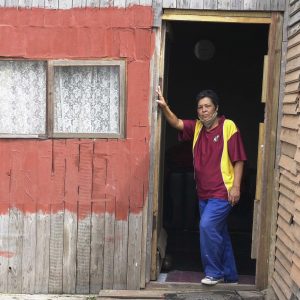Taking those first steps at school in a pandemic
Parents grapple with mixed feelings of uneasiness and excitement as their children get ready for “big” school while the Covid-19 pandemic wreaks havoc.
Author:
12 February 2021

The transition from the nursery to formal schooling is a significant landmark in children’s lives. At the beginning of each year there is the sight of excited children in oversized school uniforms, carrying colourful backpacks, trooping to “big” school for the first time. But, in 2021, this sight has an added element: little ones wearing face masks to prevent the spread of coronavirus.
As part of fighting the virus, schools must comply with stringent Covid-19 regulations set out by the health department. They include social distancing, wearing face masks, thermal screening for temperature, sanitising of hands, washing of hands for 20 seconds and no handshaking or hugging.
Can the little ones keep up with this new reality brought about by the coronavirus?
Related article:
Siposethu Dlikilili, 28, mother to Lilonke Dlikilili, 6, from Khayelitsha, Cape Town feels at ease since her child did Grade R at school instead of an Early Childhood Development (ECD) centre.
She thinks Lilonke’s exposure to the schooling environment in 2020 taught her about the coronavirus. “She even reminds us to sanitise our hands,” the mother says. Lilonke also loves to play. But she dislikes food and tends to eat only when she sees other children eating. Dlikilili fears this could lead to her child trying to swap or share food at school, thus putting her at risk of being infected with the virus.
Erica Munnik, a senior lecturer and clinical psychologist at the Department of Psychology at the University of the Western Cape (UWC), believes children’s developmental milestones and our understanding of them have not been radically altered during the Covid-19 period.
Related article:
However, the pandemic has had a significant impact on the way children engage with learning, she says. “Play is a natural part of learning and free play during break time is important, not only to develop gross and fine motor skills but also to enhance social and emotional skills,” Munnik says.
But the health crisis has forced schools to ensure learning activities, including play, comply with social distancing. “Children are not able to engage in free play anymore. They are asked to adhere to social distancing and mask-wearing. Thus, they are asked to comply with rules that are different from previous ways of doing at school. This is different from what they are used to at home,” Munnik says.
“Play is an important part of children’s lives. Continue to play with your child, balance play with homework activities… Play is children’s way to communicate, express themselves and naturally learn skills.”
Preparing your child
Johanna Duba, 39, is six-year-old first-grader Helen Duba’s mother. She is from Tembisa, Gauteng. Duba says parents were not permitted to attend the meet-and-greet event at the start of school as it poses high risks for the spread of Covid-19.
Before the Covid-19 pandemic, she says parents and guardians had an orientation session to be acquainted with the school, classroom, teachers and the other children, and they would “greet and hug” each other. But with the coronavirus pandemic, this no longer happens for safety precautions.
Parents seem to report greater ambivalence as their children begin formal schooling amid a pandemic. Lerato Morake, 29, also from Tembisa, is both worried and excited for her six-year-old son, Vusimuzi Morake. Morake says preparing him to remember Covid-19 protocols requires a lot more work. “I noticed it’s going to be harder for him to keep a mask on and not to be able to play with other kids without any contact,” a concerned Morake says.
Related article:
Even though it is daunting, parents do try to teach their children about the dangers of the pandemic. Duba credits her child’s former ECD centre for teaching Helen about the virus. She plans to provide her child with two face masks and sanitisers when she goes to school.
Morake watches the news with her children to help them better understand the virus. “I made a routine for sanitising our hands and taught them the importance of a mask,” she says. Her first-born child is in grade four.
Munnik advises parents to involve children in choosing face masks. They could opt for ones with their favourite cartoons as an incentive for wearing them, for example. “If possible, give children a choice; they will be more comfortable to wear a child-friendly face mask,” the clinical psychologist recommends.
Related article:
Although she is happy that her child is starting school, Duba is concerned about inevitable school closures when coronavirus cases increase. Her main worry is access to and cost of digital educational resources for continued learning at home. “E-learning is expensive. We [parents] don’t have resources like free WiFi or an option of buying a tablet,” says Duba.
Munnik also paints a grim picture of what it might be like for children to be starting school in 2021. “Families are going through financial, physical and emotional challenges due to the current pandemic. Parents might have lost their jobs, or family members might have become ill and passed away.”
She adds: “Parents’ ability to parent effectively might have been impacted by the pandemic directly. They might also deal with all of the other contextual challenges – for example, hunger, violence, substance abuse – that is a reality in their home.”
Ways to cope
Creating an environment that feels less fearful will help children adjust to the “new normal”. But Munnik asks caregivers and teachers to look after themselves, too. She points out that it is normal for children to feel distressed in a new environment anyway, as the change may come with a certain amount of anxiety, worry and fear.
Even so, she says: “The pandemic might make these symptoms more pronounced. For instance, children will refuse to leave their parents in fear that they will lose them too. They will become resistant to [going to] school and will display somatic symptoms such as stomach aches or headaches.”
She recommends the following, among others, as coping mechanisms: “Make sure that routines are well established before school starts. For instance, bathing, eating and sleeping routines.” In doing so, children will become aware that there are rules to comply with at home, making the process at school easier to follow.
“Remember that it is normal to feel unsafe and anxious about the transition, especially while facing the second wave of the pandemic; try to stay calm and do the basics. If the caregivers or the child displays any symptoms of Covid-19, seek help immediately. Follow the protocols set out by the department of health… and let the teacher know.”




